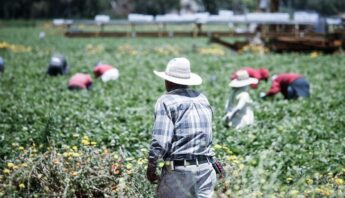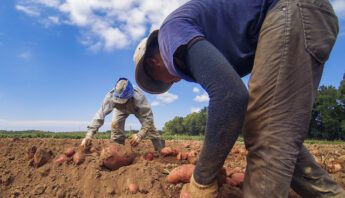Who'd have thought? United Farmworkers (UFW) and the California Farm Bureau Federation (CFBF) are on the same side of the table when it comes to farm labor and immigration reform. Since 2007 the Farm Bureau has been supporting and promoting AgJobs — a compromise bill negotiated by farmworker leaders and farmers.
This month CFBF took their message to Washington, D.C. to argue against introduction of E-Verify, a mandatory electronic verification program to determine an employee's eligibility for employment. E-Verify, the Bureau claims, would lead to the collapse of the agricultural industry. UFW agrees.
Herein lies the under-appreciated underbelly of immigration debates: our agricultural economy is flatly impossible without immigrant labor. And the Farm Bureau knows it.
E-Verify would not only cause major dislocations in the agricultural industry and serious economic losses, it would have truly terrible consequences for a half million farmworker children, most of whom are U.S. citizens whose parents are without legal status.
Farmworker policy reform overdue
Current government policies reinforce a power imbalance that leaves farmworkers with poor wages and horrendous working conditions. The following excerpt from a UFW letter to the House Judiciary Subcommittee clearly explains how reform of these policies would benefit both growers and workers:
The current situation is not good for farmworkers who want to be able to work legally and earn a decent living to support their families. It is not good for employers who want to hire people without worrying that they will be raided by the immigration service at the peak of the harvest of their perishable fruits and vegetables. It is not good for the government, which needs to know who is working in our economy and living among us.
But it is no answer to say we will deport them and start again. The growers need these experienced workers to cultivate and harvest their crops. In fact, many growers contend that there are labor shortages in some areas because undocumented workers are too fearful of immigration raids to come to the open fields.
Under AgJobs, undocumented workers in the country now would earn legal status by continuing to work in agriculture. It offers growers a legal and stable work force, ensures workers already in the U.S. receive jobs before foreign workers are brought in, and protects guest workers from being exploited. The proposed law has been embraced by leading Democrats and Republicans in Congress — but has yet to move forward and become law.
Immigration reform is one good example of how unusual alliances can help achieve policy change in Washington, D.C. Strange bedfellows may also be key in the upcoming swirl of negotiations on the 2012 Farm Bill — a large package of federal farm and food legislation, worth billions of dollars, that set the farm, food, and rural policy goals and priorities for the country.
We'll keep you posted here as these policy battles moves forward on the national stage.








